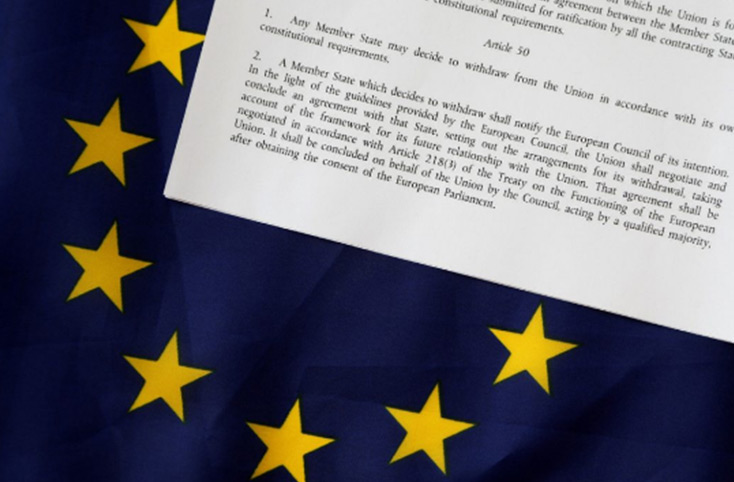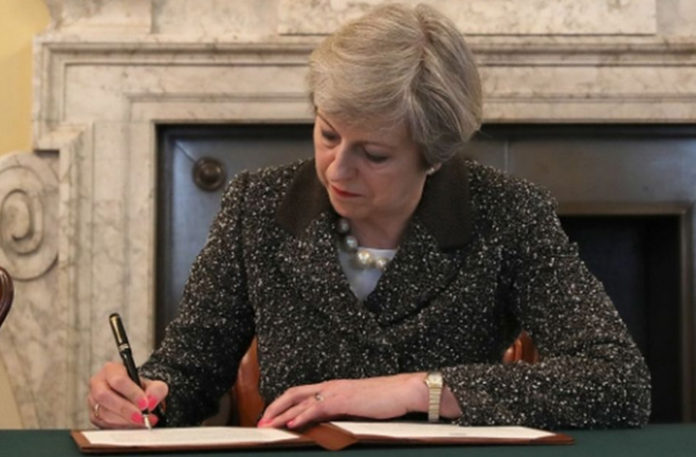The British Prime Minister Theresa May signed the letter to trigger Article 50 formally.
The UK PM gave official notice under Lisbon Treaty, a letter to the EU Council Donald Tusk.
Here is Theresa May’s statement on triggering Article-50 for Brexit negotiations.
“When I sit around the negotiating table in the months ahead, I will represent every person in the whole United Kingdom – young and old, rich and poor, city, town, country and all the villages and hamlets in between. And yes, those EU nationals who have made this country their home.”
What is Article 50?
Article 50 is the plan created by the EU for any country which wants to leave the European Union. The plan was set up as a result of the Lisbon Treaty signed by all European Union Countries and became law in 2009.
The Contents of Article 50
 The contents of Article 50 point to the fact that any country in the EU which wishes to leave the union must notify to the European Council. The country will have to negotiate the terms, reachable within two years. However, the two years’ period is extendable if all parties agree to it. Also, the country which wants to leave, Britain in this case, cannot become part of the internal European discussions.
The contents of Article 50 point to the fact that any country in the EU which wishes to leave the union must notify to the European Council. The country will have to negotiate the terms, reachable within two years. However, the two years’ period is extendable if all parties agree to it. Also, the country which wants to leave, Britain in this case, cannot become part of the internal European discussions.
A qualified majority of 72% of the European Union nations must approve the deal, representing 65% of the total EU population. The approval can only be given after MEPs support for it. However, if the country wants to rejoin the EU, there is a provisional Article 49 available as well.
Long Time Required for Negotiations
The Brexit negotiations need an extended period of time because of so many items requiring discussion. The another reason for such long time is because this kind of EU exit negotiations has never been done before by any country in the European Union.
Timeline of the Events to Brexit Negotiations:
16th March 2017 – Queen gave permission to go ahead with the Brexit negotiations by giving royal assent.
29th March 2017 – The Article 50 has already been triggered by the British Prime Minister Theresa May.
29th April 2017 – EU summit of 27 nations without Britain to give EU Commission the mandate to provide go head to the UK for Brexit.
May – By this time the European Commission is expected to provide negotiating guidelines as per the mandate to be given by the 27 nations. It may also mean a possible future negotiation on EU-UK trade deal.
May or June 2017 – The Brexit negotiations formally begin between the EU and the UK.
23rd April and 7th May 2017 – The Presidential Elections in France.
24th September 2017 – The German parliamentarian elections will commence.
Autumn 2017 – The UK government will introduce legislation to leave the EU. The British Government will put all existing EU laws in the UK into British Law called Great Repeal Bill.
October 2018 – The time by which the UK aims to complete the negotiations.
October 2018 and March 2019 – A vote by The House of Parliament, European Parliament, and European Council on a deal.
March 2019 – Britain is expected to withdraw from the EU formally. However, if the UK is not able to reach a deal, it may extend Article 50 Brexit negotiations even further.
Topics Under Discussion
Brexit negotiations aim to cover a wide variety of subjects. Some of the issues extensively discussed during the negotiations include Transitional Deal, Security, Sovereignty, Northern Ireland Border, Expats, and Trade.
Here are some of the areas expected to come under discussion during the Brexit negotiations.
- The unutilized EU funds which due towards UK regions and farmers.
- Matters relate to foreign policy issues.
- The access to the UK to EU Agencies, which have a role to play in UK’s local laws.
- The EU Free Trade Agreement with other countries and underlying transition arrangements.
- The access to be given to the UK citizens for European Health Insurance Card.
- To look after the rights of the UK fishermen fishing in non-UK waters as well as the North Sea.
- Commitments related to the environment made by Great Britain at different UN conventions.
European Commission has created a task force, led by Michel Barnier to conduct the Brexit negotiations with the UK. The British Prime Minister Theresa May will lead the Brexit Negotiations for her country. The Department for Exiting the EU, headed by David Davis will support the British Prime Minister.


